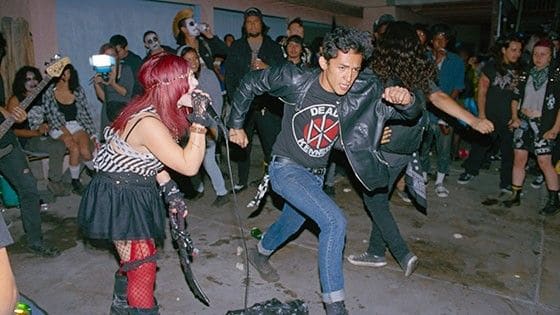Eye For Film >> Movies >> Los Punks: We Are All We Have (2016) Film Review
Los Punks: We Are All We Have
Reviewed by: Jennie Kermode

It's difficult to tell the story of a community without having some personal connection to it. Having a close connection, it's difficult to tell that story in a way that one can be confident outsiders will understand. Films like Los Punks are in many ways happy accidents - portraits whose subjects actually like them yet which successfully communicate with others, helping them see what the community is all about.
This is not to underestimate the skill of director Angela Boatwright. Although her film looks, superficially, like simple observation, closer study reveals a multitude of tales and themes carefully teased out of the chaos. Boatwright is a geographical outsider but a spiritual sibling to the Los Angeles punks in whose world she immerses herself. She understands their ethos; they accept her as one of their kind, yet their stories are new to her, and we watch them unfold as she does.

There are dozens of interviewees in this film and their stories slot together haphazardly, but strong characters emerge over time, each revealing something significant about the scene. We see the gigs and parties that form its backbone but we also see glimpses of private lives. Many of those who make up the scene come from rough backgrounds and several have experienced abuse of one kind or another. They're almost all Hispanic, socially disadvantaged and living in poverty. Boatwright illustrates how their community has helped them through this, partly because they've been able to find kindred spirits and partly because they can help each other out at a practical level with things like accommodation and food. Some, however, have the kind of lives that outsiders might not expect - one is training to become a chef, another a lawyer.
Also important here is what we see of the inclusivity of the scene. Female voices are as prominent as male ones ad there are a number of visibly disabled people enjoying the gigs, receiving assistance where necessary. Though most of those interviewed are in their teens or twenties there are a fair number of older punks around. It's noted that nobody cares about things like sexual orientation. They don't even care what type of punk somebody is - more of an issue than you might think in some circles - and goths and metallers also blend easily into the scene.
Boatwright has done an effective job of taking a group of people often perceived as anti-social and revealing the social bonds that underlie their activity and creativity. This is a film that will have particular appeal to punks and members of similar communities around the world, tired of being clumsily stereotyped in films, and it will be an eye-opener for many other viewers.
Reviewed on: 26 May 2016















